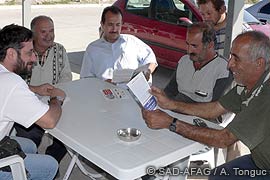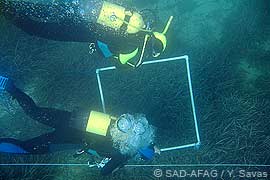

 |
||
 |
||
Vol. 8 (2): December 2005 |
||
Croatia / The Gambia / Greece / Italy / Madeira / Mauritania & Western Sahara / Turkey
Turkey
|
 |
|
|
AFAG staff introduce the rescue network to local inhabitants. |
SAD-AFAG, in cooperation with the Greek NGO MOm, has already established a monk seal rescue and information network (AFBIKA) on the south-west Marmara and Aegean coasts of Turkey, between Karabiga – Fethiye, with the financial support of the EC. This network, with its 136 individual or organisational/company members, is now operational and is providing recent sightings data for SAD-AFAG.
SAD-AFAG, in cooperation with the Dokuz Eylul University - Institute of Marine Sciences and Technology, received additional funding from EC sources through REC (the Regional Environment Centre) for developing the AFBIKA further east, on the Mediterranean coasts of Turkey. In this study, the project team will visit the coastal settlements between Fethiye and Samandag and seek out local contacts to participate in the network. Thanks to the REC and EC financial support and the technical know-how and labour of the Institute of Marine Sciences, SAD-AFAG will begin to store all its monk seal sightings data in GIS.
Through these means, it is hoped that a clearer picture of the species’ status in Turkey will emerge. The project is expected to conclude by the end of February. – Yalçin Savas, SAD-AFAG.
A new project to be executed in Foça, with the support of the EC through REC (the Regional Environment Centre), will further develop the zoning plan of the Foça Marine Protection Area to include bird habitat and sea grass meadows. The grant was obtained by the Foça Municipality, which is collaborating with SAD-AFAG, Dokuz Eylul University - Institute of Marine Sciences, the Aegean Nature Society based in Izmir and the Foça Public Library to achieve the project’s goals.
 |
|
|
|
A zoning plan, based on monk seal data, had previously already been developed and submitted to the government as a result of a project supported by the EU’s SMAP program in which WWF MedPO and SAD-AFAG were partners. That zoning plan is to result in the enlargement of the Foça Specially Protected Area, following its submission by the Authority for the Specially Protected Areas to the Council of Ministers.
The area’s zoning plan will now be developed further by including bird habitat and sea grass beds.
Field studies have continued to map the Posidonia oceanica meadows, to determine threat factors and to develop methods of decreasing the degradation seen in sea grass beds in certain spots. Foça’s avifauna was first studied in the early 1990s. Through this project, the area will again be studied for its avifauna, though with a emphasis on protected area management.
All new information to be extracted by the project as well as already existing data will be stored in GIS for evaluation and for long-term monitoring of the Foça Specially Protected Area.
A visitor’s information centre will also be established, to be set-up within the Foça Public Library, with information boards about local nature and the protected area, and a mini cinema with 30 seats. – Yalçin Savas, SAD-AFAG.
The Technical Sub-Committee (TSC), which consists of the core members of Turkey’s National Mediterranean Monk Seal Committee, held its first meeting in several years on 7 December 2005 at the Ministry of Environment and Forests in Ankara. Representatives of the Nature Protection and National Parks General Directorate, SAD-AFAG and METU Institute of Marine Science attended, as well as the Ministry of Agriculture, Ministry of Tourism & Culture and the Authority for Specially Protected Areas (ASPA).
Cem Orkun Kiraç and Dr. Ali Cemal Gücü made presentations on behalf of their organizations, SAD-AFAG and METU-IMS respectively. In both presentations, the TSC members were briefed about monk seal research and conservation activities, including national and international projects carried out between 2000 and 2005. The updated information provided a basis for further discussions during the meeting.
In the first round of discussions and negotiations focusing on the conservation of the monk seal along Turkish coasts, SAD-AFAG requested that implementation of management plans covering 3 coastal areas (also designated as ‘Important Monk Seal Sites’) – namely Foça, the Karaburun Peninsula and west Mersin coasts – be speeded up. This met a positive response from the Ministry of Environment and Forests (MoEF). The coastal zone management plans for Foça, Karaburun and west Mersin coasts had been produced by SAD-AFAG in cooperation with the Ministry of Environment during an EC-funded SMAP project between 2002 and 2004 [TMG, passim].
METU-IMS requested that MoEF place a warning plate at the entrance of a monk seal cave near Silifke (near Mersin) in order to caution visitors that the cave is used by monk seals and human access is prohibited. However, a MoEF delegate rejected the idea, claiming that such a plate may, on the contrary, attract more people by arousing even greater curiosity.
SAD-AFAG emphasized the importance of replacing the Foça SPA patrol boat ‘Cevre’, which has been out of action for some time, being beyond repair. The MoEF immediately approved the idea and asked ASPA to provide a new vessel, since Foça comes under its jurisdiction as an SPA.
In another development the MoEF will be requesting the Ministry of Agriculture (MoA) that it receive renewed representation in the Aqua Products Council, thereby allowing it to take part in the decisions governing fishery rules and codes of practice handed down every year. This idea is supported by METU-IMS and SAD-AFAG so as to encourage a more balanced decision making process in the council that will prove fairer to conservation interests.
METU-IMS has asked both the MoA and MoEF to enhance control of illegal fishery activities and to maintain existing trawler bans along the west Mersin coasts, thereby helping to support recovery of the monk seal colony and increase the viability of the species in the area. SAD-AFAG strongly urged the MoA and MoEF to maintain the ban on the targetting of Dusky grouper (Epinephelus marginatus) and Dogtooth grouper (E. caninus) by divers armed with harpoons, on the grounds that it will benefit both monk seals and artisanal fishermen. MoA will consider SAD-AFAG’s proposal and respond in due course.
Last but not least, SAD-AFAG’s proposal for enlargement of the Foça SPA in a northern direction up to Cape Aslan (covering Hayirsiz and Kartdere Islands and adjacent mainland coasts) will be put into force immediately, as stated by the representative from ASPA. The idea of enlargement derives from previous attempts by SAD-AFAG to bring a concrete status for 5 high-priority Important Monk Seal Sites in Turkey. The decision to press ahead with expansion was subsequently confirmed by Mr. Osman Pepe, Minister of Environment & Forests in a press meeting held on 7 May 2004 in Çiragan Palace in Istanbul, attended by Yalçin Savas of SAD-AFAG. – Cem Orkun Kiraç, SAD-AFAG.
|
Oh, that scientific accuracy EndQuote“Did You Know? The Mediterranean monk seal is one of three species of monk seals; all were named for their brown or black coats, which reminded someone of a monk’s robe.”
|
Copyright © 2005 The Monachus Guardian. All Rights Reserved |